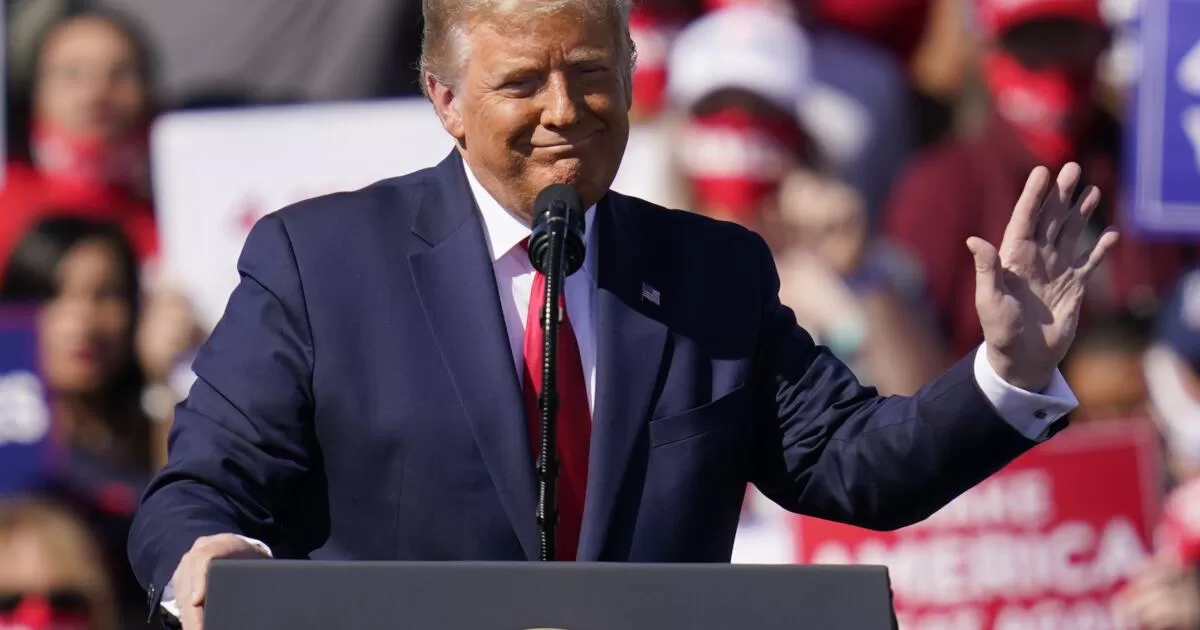But instead of deflecting, Trump’s move tied him even closer to the issue by placing his political fate in the hands of judges and state lawmakers willing to go far beyond where most voters stand.
It didn’t take long to see that dynamic, and its consequences, play out.
A day after Trump publicly announced his position, the Arizona Supreme Court upheld a near-total abortion ban, enforcing territorial legislation passed in 1864 — a time women couldn’t vote and chattel slavery was perfectly legal in America.
While court proceedings are likely to delay implementation of the ruling, the political impact was immediate, moving the abortion issue to the fore in a key battleground state, reminding voters of Trump’s role in overturning Roe vs. Wade and handing a gift to President Biden and fellow Democrats.
“As it is, voters think that Republicans want to take women [backward],” said Christine Matthews, a pollster with moderate GOP clients. After Tuesday’s decision, “you can just write the commercial: ‘Republicans want to take women back to the ‘60s — the 1860s, that is.’ … It’s just insane.“
Arizona — one of a handful of states that will probably decide the presidential election — is also one of several where proponents have qualified or hope to qualify November ballot measures enshrining abortion rights into law.
The effort to reach Arizona’s ballot received a major boost as a result of Tuesday’s decision, said Barrett Marson, a Republican strategist in Phoenix.
“There’s the economy. There’s immigration and there are other issues, of course,” Marson said. “But now abortion zooms to the top.”
The ruling seemed to catch many in Arizona off guard, and the fear of repercussions was evident in the response of several leading Republicans, among them former Gov. Doug Ducey. He appointed the four justices who upheld the 1864 law in a 4-2 decision.
“The ruling today is not the outcome I would have preferred, and I call on our elected leaders to heed the will of the people and address this issue with a policy that is workable and reflective of our electorate,” said Ducey, who signed a 2022 law allowing abortions in Arizona up to 15 weeks.
That legislation was nullified by Tuesday’s decision, which gave precedent to the 1864 law and a ban on abortion “except those necessary to save a woman’s life.”
Abortion has long been a nettlesome issue for Trump, whose stated views have evolved over the decades from supporting to staunchly opposing legalized abortion.
In a video statement Monday, he again took credit for nominating the three conservative justices who allowed the Supreme Court to overturn Roe and roll back the country’s 50-year-old constitutional right to abortion.
But after months of musing over whether to support a national ban and at what stage of pregnancy — 15, 16 weeks? — Trump landed on a perceived middle ground. States should decide the issue, the former president said, not lawmakers in Washington.
That disappointed some of the most ardent abortion foes, among them Trump’s estranged ex-vice president, Mike Pence, who called it “a slap in the face to … millions of pro-life Americans.”
That said, leaders of several major antiabortion groups were quick to reiterate their support for Trump in November, reasoning that the presumptive GOP presidential nominee would still be a better choice than Biden.
“We want to protect as many babies as possible,” Penny Nance, the chief executive of Concerned Women for America, told Politico, “and supporting President Trump does that.”
Polls have consistently shown that most Americans believe abortion should be legal to at least some degree — especially during the first trimester of pregnancy — and that a broad, bipartisan majority favor abortion rights in cases of rape, incest and when the mother’s health is seriously endangered.
Most voters, however, don’t cast their ballot based solely on the abortion issue, and even those who do tend to support candidates coming closest to their position, even if they disagree on some of the particulars.
Where the issue has mattered in recent elections is driving new voters to the polls, or motivating those who otherwise might not show up to cast a ballot. All evidence suggests that turnout has worked to the benefit of Democrats.
Biden and his party bucked history and enjoyed a relatively successful 2022 midterm election in good part because turnout in election battlegrounds surged among women and younger voters — both groups that tend to support legal abortion.
When the issue has been put directly to voters in the form of a ballot measure, significant majorities have upheld abortion rights in more than a half-dozen states, including such Republican bastions as Montana, Kentucky and Ohio.
“We know when voters have a chance … they vote against extreme bans,” Matthews said.
That’s why Tuesday’s state Supreme Court decision could prove vital come the fall — if those voters also support Biden.
Democrats from Washington to Arizona were eager to capitalize on the ruling. Vice President Kamala Harris announced a Friday trip to Tucson, where she plans to discuss reproductive rights, and issued a statement condemning Trump.
Stacy Pearson, a Democratic strategist supporting the Arizona ballot measure, said the decision underscored the urgency of putting the abortion issue before voters in November.
She expressed confidence proponents would have the nearly 400,000 signatures needed to qualify the proposed constitutional amendment, but said they were aiming to gather as many as possible by a July 3 deadline, to withstand any legal challenges.
Pearson alluded to the high court’s ruling and its throwback to Arizona’s territorial days. “I’m urging women to go sign the petition,” she quipped, “while they’re still [allowed] to drive.”
